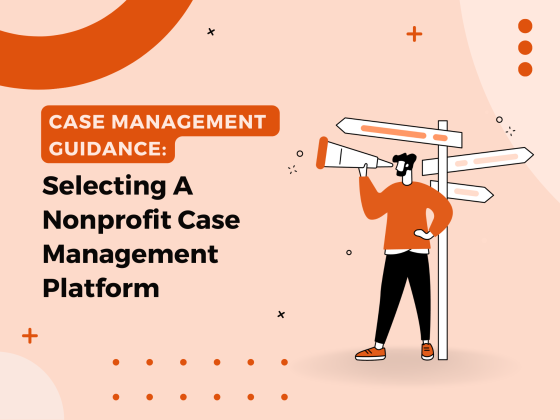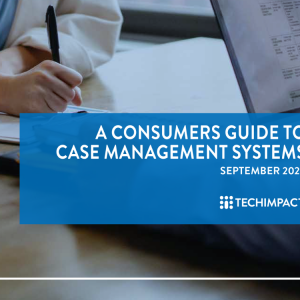Case Management Guidance: Selecting A Nonprofit Case Management Platform
The late Steve Jobs once said, “you cannot mandate productivity, you must provide the tools to let people become their best.” At Exponent Case Management, we take this philosophy to heart by providing the most advanced human services case management platform to help changemakers drive radically better impact for the communities and people they serve. As a Salesforce-based innovator, we provide a consolidated, intuitive system from which any human services organization — with any program structure, any assessment, and with any desired outcome — can benefit. Our platform is certainly impressive, but where we truly shine is our ability to understand the needs of the social services sector and design flexible features that enable you to facilitate measurable, demonstrable change.
But how do you know if Exponent Case Management is the right fit for your organization? That’s where our case management guidance comes in. Our team has put together some guidance to help organizations navigate the complex world of case management systems, and make the best decision for their organization. We understand the specific challenges and needs of the nonprofit sector and we have the expertise to help you select the right system and make it work for you. We will walk you through the tradeoffs you may experience with other options and highlight the key features of Exponent Case Management so you can make an informed decision about which system is best for your organization. Don’t miss out on this valuable resource for your organization’s success.
One Consolidated System – Platforms versus Point Solutions
We’re going to start with this piece of case management guidance because it’s crucial. As a nonprofit leader, you are constantly facing the challenge of doing more with less. Resources are limited, and the pressure to make a meaningful impact is high. In this environment, it’s essential to work smarter, not harder. One way to achieve this is by streamlining your case management processes with a consolidated system.
- The last thing you need is to have your staff spending precious time and energy inputting data into multiple systems. Not only is this task cumbersome and inefficient, but it also takes away from your ultimate goal of serving as many clients as possible and creating impact.
- Having data spread across multiple systems can lead to a lack of data clarity, lengthy reporting cycles and lost funding opportunities. With a consolidated system like Exponent Case Management, you can improve data visibility and reporting, and increase your chances of funding opportunities.
- A consolidated system can provide you with a holistic view of your clients, thereby improving communication and collaboration among your team members. This also means that your staff will have a better experience working with a modern, user-friendly system, reducing staff turnover and increasing productivity.
Let’s dive into some of the reasons in more detail!
Clarity and ease of reporting
With all your client data in one place, data and evaluation staff can effectively analyze their outcomes across programs and program staff can better understand how their clients are being served across the organization. Having one consolidated system can provide data clarity, enable anyone in your organization to access real-time insights about your program efficacy and empower staff across your entire organization to be more efficient in their work.
A tool for everything and everyone in your organization
According to a recent Nonprofit Trends Report, only 36% of nonprofit professionals are “very satisfied” with the technology they have to do their jobs and leaders often state they have too many systems that don’t integrate with each other. That’s because creating change does not happen in a silo and neither should the systems you use to support your work. With Exponent Case Management, we not only provide you with the best-in-class suite of tools to manage your client’s progress, program performance and impact management, but there is something for your entire organization. That’s because ECM is built on the world’s best CRM: Salesforce.
Our partnership with Salesforce enables you to run your entire agency on one system, from fundraising to volunteer management and beyond. An example of how consolidated data would benefit fundraising teams is that they can tell the story of the organization’s work more effectively. With Exponent Case Management, we give you a 360° view of your clients journey and progress through your agency.
In addition, Salesforce’s massive investment in R&D innovation and more than 4,000 integrated applications means you have a solution for every need. So if you have a need outside of our suite of tools, you better believe there is an app for that.
Solving complex challenges
Now if platforms like Exponent Case Management and Salesforce do many things, then point solutions set their sights on narrower goals. A point solution is any tool or software that aims to address a single use case or challenge that exists within an organization. When the focus of a solution is too narrow, you’ll need multiple systems for multiple challenges and as we just stated, that leads to organization wide inefficiency. In addition, with point solutions you’ll need to consider if you have the internal technical capacity to manage multiple point solutions with limited integrations, software incompatibilities and a lack of scalability.
Don’t just take our word for it, check in with your colleagues for some case management guidance! We often hear from customers migrating from common point solutions that they have costly maintenance, a lack of efficiency and data silos even between different programs within the organization. Ultimately resulting in a limited view of your client’s journey across your organization and difficulty in measuring the effectiveness of your programs and services.
Exponent Case Management and other Nonprofit Case Management Solutions on Salesforce
In 2020 Salesforce released its Nonprofit Cloud Case Management (NCCM) and Product Management Module (PMM) products to help nonprofits meet their missions. As an innovator in the space, having launched Exponent Case Management (ECM) back in 2013, we couldn’t have been more inspired to see Salesforce make the investment to provide nonprofits with additional tools to help them achieve their missions. We know that this massive investment only supports a more results oriented social sector. Now, because ECM is built on Salesforce, this can sometimes cause confusion — so, let’s examine this further in great detail with an overview of each solution before we dive into the differences.
PMM: Program Management Module
Program Management Module (PMM) in Salesforce’s Nonprofit Success Pack (NPSP) provides you with a standard framework to help you track a program or service. It provides support for tracking programs, program engagements, transactional service deliveries, and cohorts. While most of these are self explanatory, cohorts in this context refers to assigning “program engagements to cohorts based on criteria meaningful to you.” The two main components PMM include:
- A standardized Salesforce data model with core fields for tracking programs, program enrollments, service delivery, and cohorts.
- A bulk service delivery tool to track the same service delivered to groups.
Some additional functionality the module provides:
- Basic permission sets with core security use cases
- Configurable Process Builders that help with auto-naming of records
- Customizable home page and program pages
- Customizable program pages to track key program metrics
- Core reports and dashboards
Who is the PMM ideally for?
The PMM is applicable to a broad range of nonprofits who are new to program management and have simple program processes in place. A piece of case management guidance for you: the great part about PMM is that it’s free and compatible with NPSP. It’s a good solution for organizations that are wanting to track basic programs, program enrollments, transactional service delivery, and/or groups clients into cohorts. For example, an after-school program that provides nutritional education and resources may simply need to count the number of students served. In these cases, the PMM is worth evaluating and we’re happy to walk you through what this means for your organization.
Who is the PMM not for?
If you already have a Salesforce instance with existing architecture for program management, you’ll need to consider that adding PMM would mean reexamining your business processes, security models, and potentially migrating data to be compatible with the data model. This process can be time-consuming and requires the attention of a seasoned consultant. When searching for case management solutions, keep the name in mind. The Program Management Module does just that — tracks straightforward programs. If you’re looking to track individual clients, progress, or programmatic outcomes, keep on reading.
NCCM: Nonprofit Cloud Case Management
Launched in 2020, Nonprofit Cloud Case Management (NCCM) enables you to deliver personalized services to help clients progress towards their goals. It enables you to go beyond program enrollments to track intake, referrals, clients, services, case plans, notes, incidents and assessments. By having programs, services, and clients in a single system, organizations can reduce data silos and increase efficiency. Some components of this solution include:
- Client intake with pre-configured templates that differ by program or a referral process to refer clients to another organization.
- A standardized case manager home page that shows upcoming client meetings, tasks, or incidents that are in need of immediate action.
- Case notes from pre-configured templates, with the ability to save it for later or tag it for the organization.
- The ability to set up recurring services for groups or individual participants and tracking attendance.
- Functionality to create a personalized service plan.
- Assess your clients’ baseline status with assessments.
Who is NCCM ideally for?
NCCM, paired with PMM, is a good solution for a wide range of nonprofits who want to track individual people and programs. The great part about NCCM is that it’s compatible with NPSP. It’s a good solution for organizations that are wanting to track straightforward metrics about individual participants, keep track of case notes, assessments, service plans, attendance and housekeeping tasks related to cases. In essence, it’s the right fit for transactional case management. If that sounds like you, then the NCCM is worth considering and we’re happy to schedule a consultation with a case management expert that can walk you through some of the tradeoffs.
Who is NCCM not for?
As with PMM, if you’re an existing Salesforce user, this may not be the right solution for you depending on which architecture is already in place, your timeline and budget. While NCCM is great for straightforward programs, programs with different or complex processes are not supported. It’s a great tool for organizations that want to track the number of programs, transactional service deliveries and the number of clients served. If you are looking to track progress or understand which actions lead to better outcomes, then you’ll need to look elsewhere.
Ultimately, what you need to ask yourself when evaluating if NCCM is a good fit for your organization is: who are you serving? If you are serving an individual person that is interacting with one of your programs, NCCM is a great fit. If you are treating a couple, family or an entire household, which is often the case when removing barriers and creating systemic change, you’ll need a solution that can treat the whole family on one case record.
Let’s look at an example of an organization that provides services for Afghan refugees. If you are only providing basic services to refugees, then NCCM will work well for you. If you want to create impact for the entire family on one case record, coordinate care for multiple programs across the nation, manage interpersonal relationships, and remove barriers like housing, employment, day care, referrals to food banks, etc, you’ll need something else. So read on for more case management guidance, oh curious one.
ECM: Exponent Case Management
Exponent Case Management launched in 2013 to help multi-service organizations deliver personalized services to clients, manage the performance of multiple programs, and measure demonstrable impact. Designed by experts in the nonprofit human services space, ECM’s intuitive features support a wide variety of human services programs and has the flexibility to adapt to the most unique programs.
In addition, ECM’s modules provide turn-key solutions for vertical-specific programs like workforce development and homelessness services. These modules are designed with best practices that give you a giant head start to delivering better results to the population you serve and streamline reporting to common funders. Here is a look at just a few of the core features of the ECM platform:
- A streamlined intake and enrollment process that can be configured for any type of program, supports multiple programs and universal intake. Users can save time with automatically pre-filled intake based on existing client and case records.
- Customize any type of assessment and capture your client’s baseline status. ECM provides longitudinal tracking so you can monitor progress over time to evaluate outcomes and inform service delivery.
- Develop specific plans to prioritize the services and support provided to each client. Identify goals and objectives for each client and assign services to achieve these goals.
- Track internal and external referrals to understand the status and outcomes of these referrals.
- Define and track the services that are offered to individuals, families and groups within a program. Pre-configured service entry pages track multiple types of information related to services, such as frequency, quantity and time spent by staff on service delivery.
Some unique functionality specific to ECM includes:
- Program specific Workforce Development and HMIS Modules
- Outcomes Management
- Funder Management
- Case Management process automation and workflows ie Program Navigation
- Dynamic forms simplifying data entry
- Mass record entry and bulk service entry
- Assessment module with longitudinal progress reporting
- Pre-built industry standard assessments (CANS Family, Arizona Self-Sufficiency Matrix)
- Client & household dashboards with automated metrics
- Site Management, high volume check-in (badge scanning)
Who is ECM ideally for?
ECM is a great solution for a wide range of nonprofits, specifically those in human services, who want to track individual clients and households across programs, manage program performance and measure impact. It’s designed with intuitive features that organizations can leverage to move beyond data collection to outcomes management and program innovation. Consider ECM as your go-to transformational case management platform, where the system helps you manage client progress and improve outcomes.
While ECM can be customized for any type of program, any assessment, and any outcome, Homelessness Organizations and Workforce Development Organizations can particularly benefit from the pre-configured modules. They enable organizations to get their programs up and running faster, with built in sector specific best practices at every step. ECM users can also enjoy 3 new versions every single year, packed with sector-specific tools and a ton of helpful documentation available in our customer success center.
The great part about ECM is that it’s built on the Salesforce platform, enabling organizations to have a single, consolidated system to support the entire organization from fundraising to volunteer management and beyond. If you’re looking for an all-encompassing, flexible tool that works the way you work, then ECM is it. We would love to walk you through how your organization and the people you serve can benefit from implementing Exponent Case Management.
Who is ECM not for?
Typically organizations that are serving a small number of constituents or have one straightforward program, will not benefit as much as others from the vast array of features provided on the platform. As with the others, if you are an existing Salesforce user, you’ll need to examine the architecture of your current system and your business processes to truly understand the impact this will have on your organization.
Which Solution is Right for Your Organization?
So, now that you’ve made it this far, which one should you choose?
PMM is right for you if you are looking to manage a single program.
NCCM is the right choice for you if you want to track individual people, programs and information related to cases.
ECM is the right choice if you are looking for a comprehensive human services platform with powerful case management, program management, and reporting capabilities that provide a 360 degree view of your clients and their household’s progress along their journey with your agency.
A parting note
While we hope this case management guidance has been helpful in your selection process, none of the solutions mentioned above come “out of the box” and will all require an implementation of some sort. Ultimately what you need is a partner, one who fosters product innovation and has implementation expertise and who understands the human services space, has solved similar challenges, has walked your path and intimately understands the issues you face when it comes to creating progressive social change.
Which brings you here to us. We’re a team of expert strategists, developers, product managers and implementation specialists on a mission to make nonprofits radically better at driving social impact. Because our team understands your organization, processes, and people in great detail, we’re already fully invested in you. Let us be there to guide you along the way. Contact us for a consultation today or sign up to watch a demo here.




